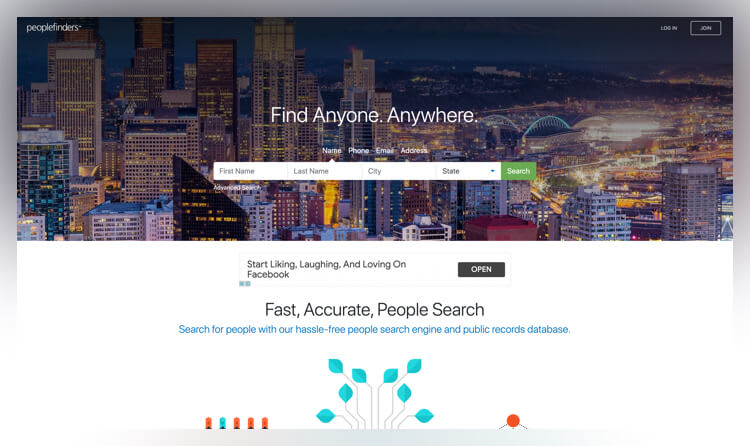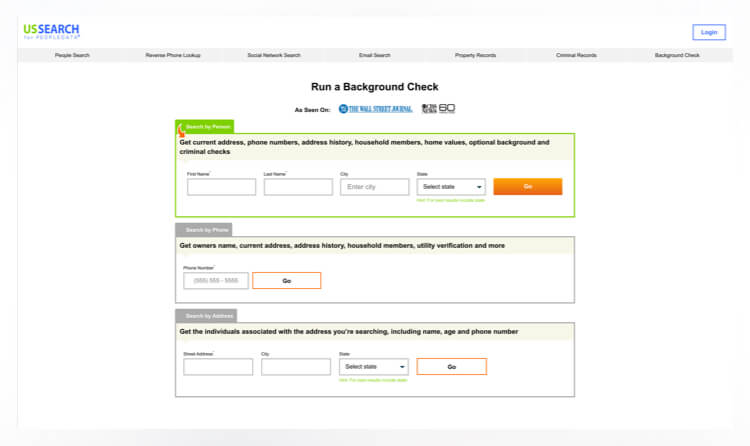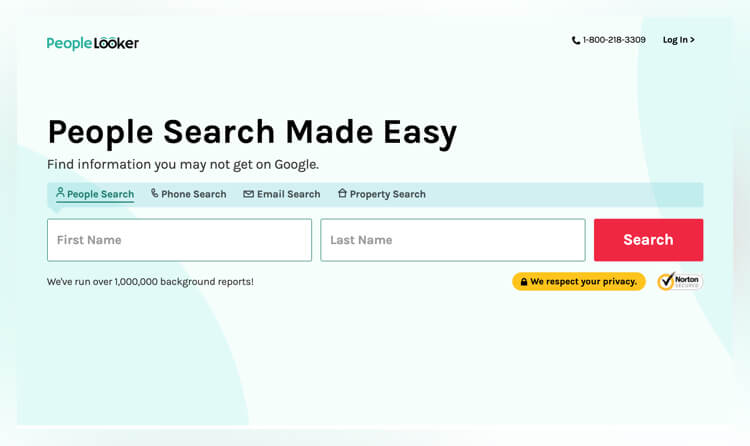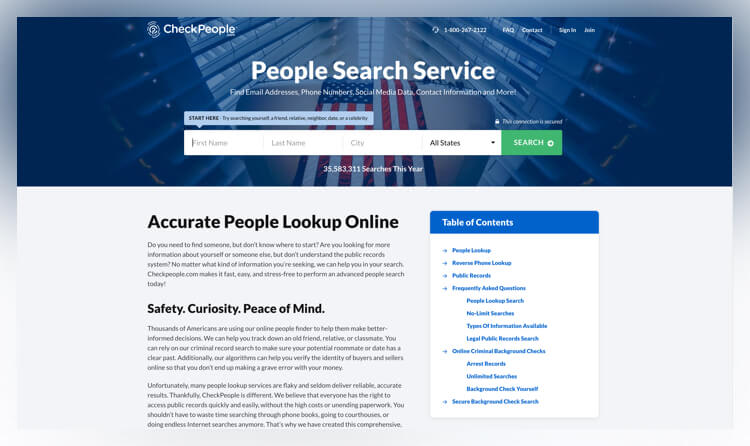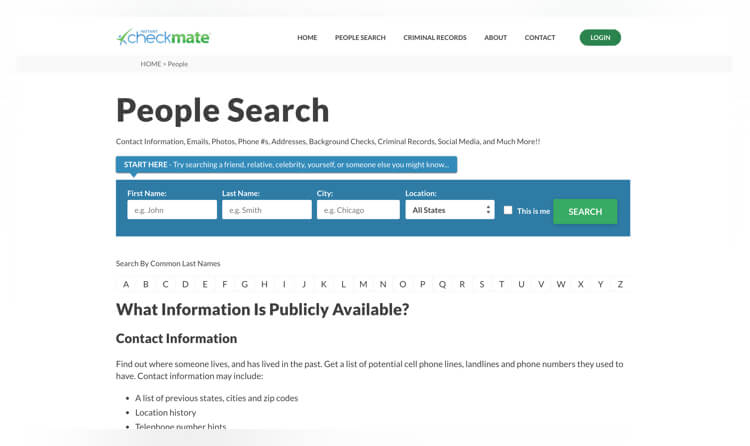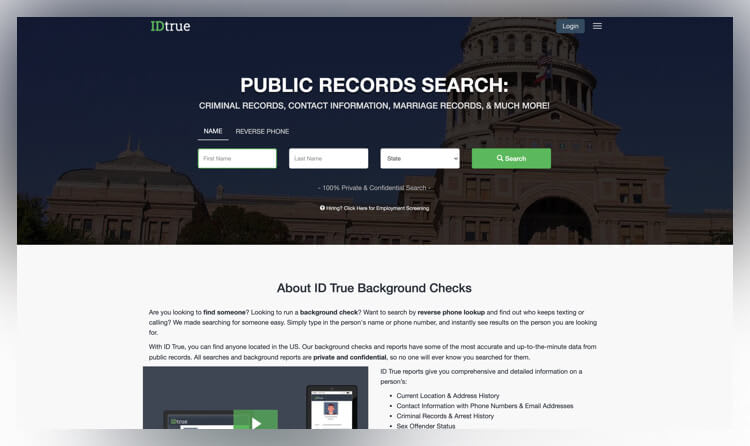How Does a Background Check Work?
A background search uses various online services and tools as well as publicly available information to discover details about someone's background, like location history, social media accounts, known aliases, criminal and traffic records, and more. While it's possible to search public records manually, the process would be more arduous and time-consuming than using a background check service.
Typically, someone using a background check company enters a person's name into the service's online search tool. The company then delivers a detailed report with background information on the search subject. This process usually takes five minutes or less.
Some background check services also allow consumers to search by phone number, physical address, or social media username. And while many providers require users to sign up for a monthly subscription rather than purchase a single report, some do offer trial periods.
What Are Some Reasons To Use Background Check Services?
There are many reasons to use an online background check service. Some people conduct background checks on new neighbors or potential online dates to ensure their personal safety. Others use background screening services to connect with family or friends they've lost touch with or to look up their names to see what information is publicly available.
Choosing the Right Background Check Company
When looking for a background check company, you have to consider what you'll be using the service for—like finding a lost relative or researching suspected spam callers—and find a subscription plan that will meet these needs and is within your budget.
The background check service you choose should provide detailed reports, customizable searches, a simple-to-use web and mobile interface, and excellent customer service that's accessible by phone, chat, or email. It should also include a variety of available search term options, such as name, phone number, email addresses, address, and social media username.
Disclaimer: If you're looking to investigate criminal and traffic records, you'll want to be sure the service you use has access to federal, state, and local court sources. If you need to use a background check service for federally regulated purposes, ensure you are using a service that is FCRA-compliant.
Here are a few important factors to consider when choosing an online background check company:
Detail of Report Information
You should research whether the online background check service has a reputation for delivering detailed information in its reports and is committed to privacy.
Some background check services will turn up information on people who are not the subject of your search or include information that's not associated with your target, like social media accounts, addresses, or phone numbers. User reviews should give you a good sense of how detailed a service's report information is. Of the services we tried, PeopleWhiz delivered the most detailed background checks.
Search Customization
Search customization is essential, especially for consumers who want to conduct a background check but only have someone's phone number, email address, physical address, or social media username.
Some background check services, like Intelius and PeopleFinders, give users various search customization options outside of people lookups or allow them to conduct a more tailored check—for example, running a criminal history search rather than a general background search.
Ease of Use
Your background check service should be user-friendly and provide information in well-organized reports. This is especially relevant to users who want to conduct multiple searches.
Many background check services will provide an online dashboard where you can save and organize your searches—some, like US Search, even allow you to print PDF versions of your reports.
Customer Support
Good customer support is vital for any online background check service, so users feel confident that any issues they may encounter will be resolved quickly. Find out whether the service offers online or phone-based customer support (ideally, both).
Carefully review the background check service's cancellation policy to determine whether they permit online cancellation or require you to call a service line to cancel your subscription—especially if you plan to cancel before your trial period expires. We found that TruthFinder and PeopleLooker offer outstanding customer support, with options to cancel your subscription online or by phone.
Legal Compliance and Privacy
When conducting background checks, it is crucial to understand the legal framework and privacy considerations involved. Employers and organizations must comply with federal and state laws, ensuring that the information they gather and use is permissible and used ethically.
Background checks typically involve searching through various public records, including criminal and traffic records, arrest records, and contact details. It's important to remember that these checks must respect the rights of the individual, adhering to regulations set by the Fair Credit Reporting Act (FCRA) and other relevant legislation.
Additionally, consent from the person being checked is often required. Transparency in the process and safeguarding the privacy and rights of individuals are key to maintaining legal compliance and ethical standards in background checks.
How Much Do Background Check Services Cost?
Pricing for background check services typically varies between $20 and $30 a month. And many require users to sign up for a monthly subscription for unlimited reports rather than allowing single-report purchases. Generally, the monthly price will be cheaper if you sign up for an extended subscription. However, many services require you to pay the cost of a full subscription (such as three or six months) upfront.
Some background check providers have cheaper subscription options for specific services—like Instant Checkmate's unlimited phone search option, which will only cost you $5.99/month. Others such as BeenVerified, also offer trial periods, making them practical for people interested in conducting a single search.
Information Included in Different Types of Background Checks
Consumers can conduct background checks for various reasons—from arrest records to gun safety checks and bankruptcy records—where each check will unearth different kinds of information.
To help you key in on what you'll need, we've identified some of the most common types of background checks and what kind of data they usually discover.
Criminal and Traffic Background Checks
A criminal background check searches federal, state, and local court sources for information about felony or misdemeanor charges and convictions. Someone might conduct this type of search on a potential online date to discover whether they've ever been convicted of a felony.
Education Verification
Education verification is typically an element of a background screening run to check whether one has listed true information in their profile regarding the university they studied at, to confirm their graduation date, and to ensure the person isn't misrepresenting themselves.
Universal Background Checks
People who want to buy firearms from a licensed dealer in the US must pass a background check to ensure they aren't restricted from owning guns for reasons such as domestic violence or other felony convictions. Gun safety advocates are pushing for universal background checks, which would close a loophole that allows gun purchases in some states from unlicensed sellers (such as gun show sellers or online sellers) without a background check.
OIG Background Checks
When hiring, employers in the healthcare industry typically search the US Health and Human Services Office of Inspector General's exclusion list for healthcare professionals who can't participate in federally-funded health programs like Medicare and Medicaid. Those on the OIG's exclusion list may have been convicted of serious charges like fraud, abuse, or neglect.
E-Verify Background Checks
E-Verify is an online background check system that allows employers to compare a job candidate's information against US government records, such as those from the Homeland Security Administration and the Social Security Administration. This check is used to confirm whether a candidate is eligible to work in the United States.
Credit Background Checks
Credit background checks review someone's credit report, which contains information like credit card accounts, debts owed, and on-time payment history.
Social Security Number Trace
A social security trace confirms someone's social security number to ensure they're not using a false or stolen identity. It will also turn up a detailed address history. Employers can use this trace to confirm a candidate's identity or to determine which law enforcement jurisdictions to search during a criminal background check.
Personal Background Checks
A personal background check is when someone runs a search on themselves to determine what kind of public information is available about them. This background check is a good option if you want to determine whether any false information exists about you, so you can dispute and correct it.
Professional Licenses Background Checks
One can use a professional license background check to confirm that professional licenses are up to date and that there is no profile misrepresentation. For example, you may be checking out a personal accountant and might want to verify the professional's certification with the relevant state regulatory agency.
International Background Checks
International background checks can uncover the same information, like criminal history, included in a regular background check in any foreign country where the subject of the search has lived or worked. The type of information available will vary depending on local in-country regulations.
Social Media Scans
Social media scans search platforms like Facebook, Twitter, and LinkedIn, along with numerous lesser-known sites, for evidence of an account associated with a person's name, phone number, or email address. Not all background check services provide social media scans; if they do, the number of platforms scanned may vary.
Sources of Background Check Information
There's no one public information source that powers a background check. Instead, the information in these reports comes from various sources, such as:
- Federal, state, and local court sources
- Professional certification and license sources
- Social media sites
- Motor vehicle records
- Credit reporting agencies
- Property records
- Online phone books
Are Free Background Checks Legit?
It's possible to conduct a free background check on your own if there's something specific you're looking for. For example, you could visit the local court website in the jurisdiction where a potential online date lives to search their name in the portal for any criminal convictions.
However, the upside of paying for a background check service is that it will conduct a much more thorough and faster search by combing through a large number of public records in several jurisdictions within a few minutes.
Most online companies that provide background checks charge money, and though some websites say they offer "free" checks, they'll let you search for free but charge for access to detailed reports.
Understanding Different Levels of Background Checks
Here are the different levels of background checks:
- Level 1: Identity verification. Most searchers typically run a social security trace to confirm one's name and birth records. A social security trace will also provide a detailed address history.
- Level 2: Criminal background checks. Many organizations will conduct a criminal history background check by searching federal, state, and local court records for any felony or misdemeanor charges or convictions. However, federal and state laws regulate how criminal history can be used in different decisions.
- Level 3: Credit history and score checks. Some may conduct a credit history check, which will include credit card accounts, debts owed, and history of on-time payments, especially for roles where financial responsibility is an integral part of job duties.
- Level 4: Motor vehicle record. Certain people will use state motor vehicle records to check one's driving history. If the job duties involve driving, an employer will check specifically for any history of infractions.
- Level 5: Educational and professional background checks. Educational and professional background checks confirm one's degree with their university or by calling a former employer to verify their position and job duties.
- Level 6: Fingerprint checks. Some professions conduct fingerprint background checks for a more thorough criminal background check, such as in government or security sectors. Someone's fingerprint can be checked against the FBI's sources to search for records.
- Level 7: Verify legal work status in the US. There are searchers who use the government's online E-Verify system to check a one's information against Department of Homeland Security and Social Security Administration records. This check ensures a one's eligibility to work in the US.
How Long Do Background Checks Actually Take?
Online background check services typically provide results in less than five minutes, although some take longer. Background screening searches that scan large amounts of information usually take the longest.
Certain background checks that require contacting former employers, academic institutions, or officials can take days or weeks. International background searches can take much longer, depending on the country's process to access public records.
Factors That May Result in a Failed Background Check
Everyone conducting a background check should determine what findings would constitute failing a background check for the subject of their search. For example, an employer hiring for a driver position may decide that anyone with a major moving violation or drug offenses would fail their background check.
Ultimately, failing a background check will depend on the type of background check and why this check is being conducted (e.g., to find a responsible driver). Offering up fake or misleading information to a potential employer that's discovered by a background check will most likely make you fail it.
Additional Background Check Sites We Reviewed
Beyond the 10 sites, we've included here—all of which, for transparency purposes, are partners of Top10.com—there are a variety of other online services we've reviewed that are also worth checking out. Consider these background check services if you're looking for more options:
- SearchQuarry - Best for searching license plates or VINs
- Persopo - Best for learning more about one's family genealogy
- SentryLink - Best for users looking for an FCRA-compliant service
- Spokeo - Best for searching social media and dating sites
- DeepSearchPro - Best for scanning billions of records going back decades
We Thought You Might Find These Articles Interesting:
Final Verdict: Discover the Truth in Minutes
Background checks are a crucial resource for many people—whether you're an online dating app user looking to vet a potential match or a genealogy enthusiast hoping to connect with distant family members.
Whatever your reason, an online background check service can make the process easier by sifting through a multitude of public records for you and often delivering results quickly—without costing you a fortune. By following the advice we've presented here, you'll be well-equipped to conduct an extensive check on anyone you need.
All product names, logos, brands, trademarks and registered trademarks are property of their respective owners.
DISCLAIMER: You may not use TruthFinder or the information it provides to make decisions about consumer credit, employment, insurance, tenant screening, or any other purpose that would require FCRA compliance. TruthFinder does not provide consumer reports and is not a consumer reporting agency. (These terms have special meanings under the Fair Credit Reporting Act, 15 USC 1681 et seq., ("FCRA"), which are incorporated herein by reference."
BeenVerified is one of the best sites for comprehensive background checks. The service scours billions of public records for useful information like criminal history, address history, properties, social media accounts, phone numbers, education and professional history, relatives, and associates.
CheckPeople, one of the best background check services for uncovering criminal history, taps into deep web information databases like superior courts, district courts, and county sheriff websites, searching for felony or misdemeanor arrests and convictions.
With access to 120 billion records from over 6,000 data sources, PeopleFinders is one of the best background check services to locate family or friends you've lost touch with. The company is also one of the oldest providers on the market and has been conducting successful people searches since 1999.
If you're using background checks for professional purposes, the Fair Credit Reporting Act limits the lookback window for criminal charges to seven years. However, regulations vary by state, and some jurisdictions make exceptions for jobs with higher salaries. Services not limited by FCRA restrictions can search records going back decades, though this can also vary by jurisdiction and depend on how far back digital records are available. For example, PeopleFinders searches records that date back more than 40 years.
According to the Equal Employment Opportunity Commission, federal anti-discrimination statutes bar employers from using race, color, national origin, sex, religion, disability, or genetic information—such as family medical history and age (40 or older)—to make professional decisions. Professionals conducting background checks should ensure they comply with all federal, state, and local regulations.
Note: Some or all background search services featured on this site are not subject to the Fair Credit Reporting Act, 15 USC 1681 et seq., ("FCRA") In order to make decisions about consumer credit, employment, insurance, tenant screening, or any other purpose that would require FCRA compliance, make sure you choose the appropriate service for you. Be advised that only consumer reporting agencies may provide consumer reports. This is applicable, but not limited to, a background search, credit background check, criminal background check, and/or driving record.





.20190512142626.png)









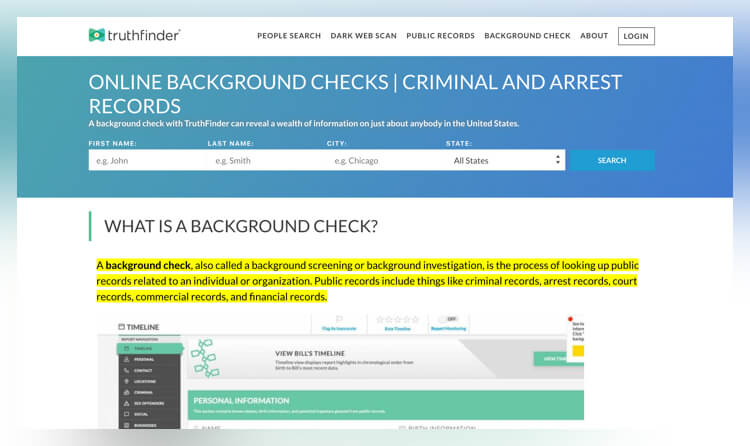

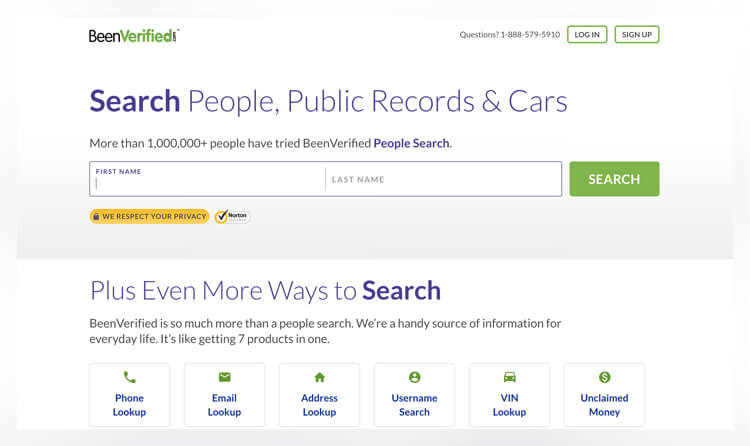

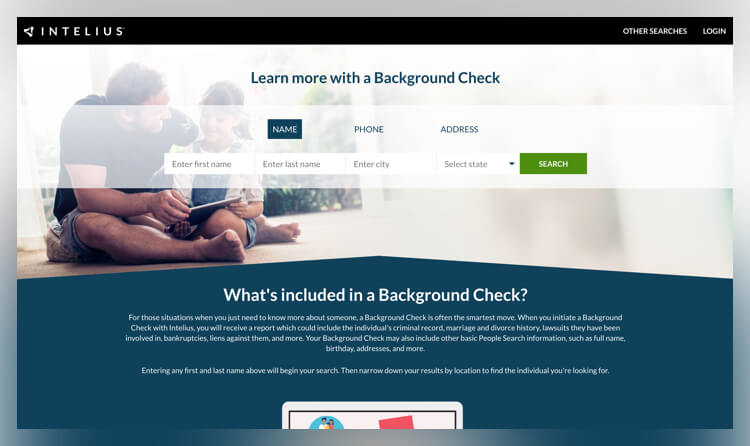

.20190512142626.png)
